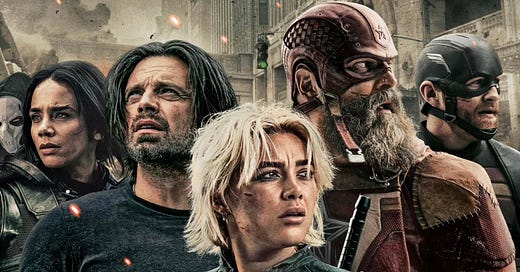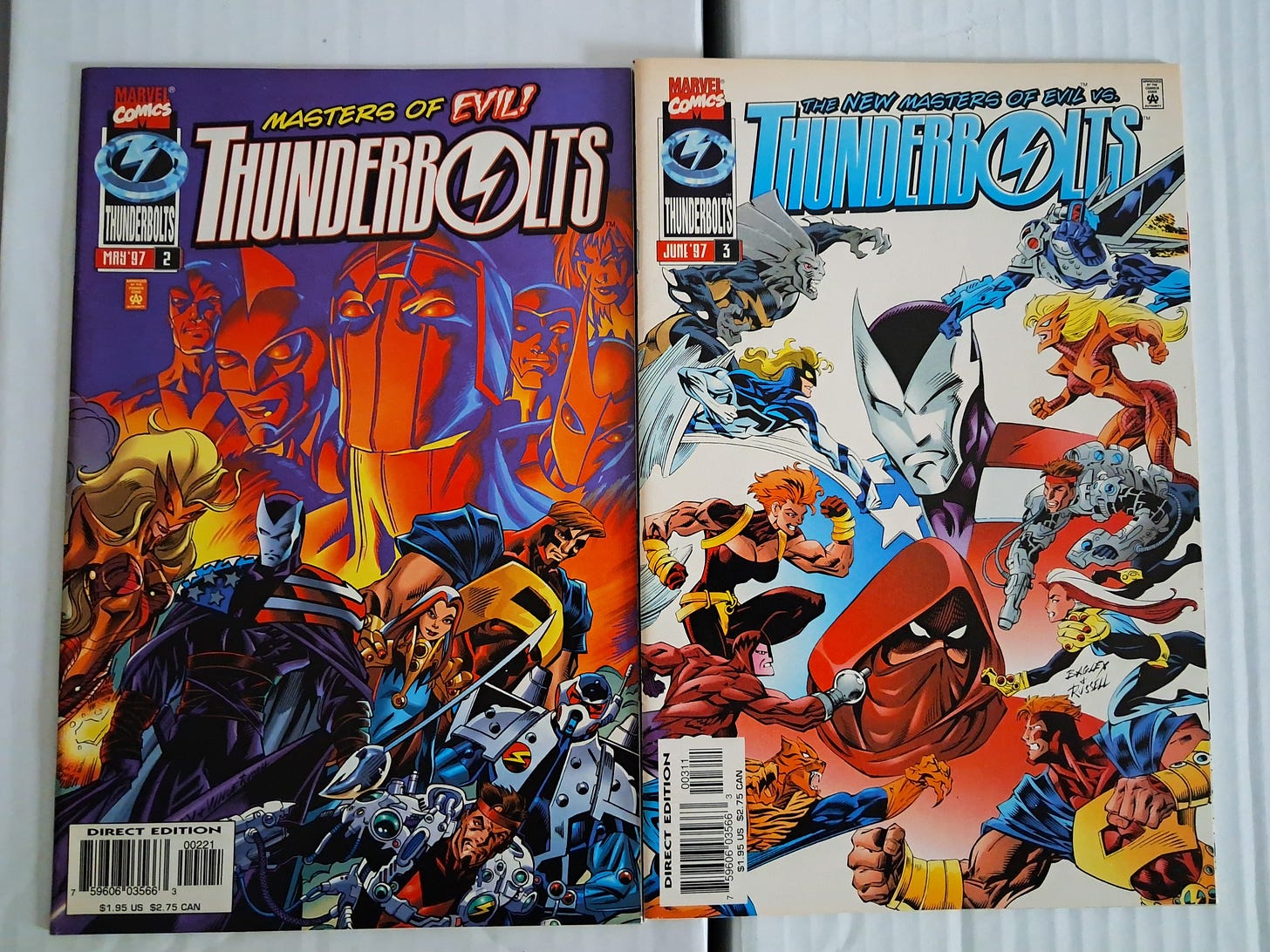Welcome to And the Quest for Pop Culture, where I explore various movies, TV shows, books, and comics. Looking for a different topic or original fiction? Check out the navigation page.
Thunderbolts* is a superhero movie with no natural heroes. Instead, the film presents us with a band of failures, outcasts, and damaged goods. And they’re just what the Marvel Cinematic Universe needs.
The movie does not adapt the original Thunderbolts comic book series by Kurt Busiek and Mark Bagley. In the late-’90s comic, a new superhero group emerged while the Avengers and Fantastic Four were presumed dead. Initially, the Thunderbolts appeared to be your standard-issue super-team, nothing we hadn’t already seen a million times before, but the closing pages of the first issue surprised readers with a twist: The Thunderbolts were actually the Masters of Evil pretending to be superheroes as part of a villainous scheme.
The twist wasn’t the real story, though. While posing as heroes and basking in the adulation of a grateful public, some of these villains realized that they enjoyed doing good deeds and helping people. Perhaps the righteous path offered a better way to live.
That was the real story—villains learning to be heroes and wanting to be heroes while still embroiled in the scheme of Baron Zemo, who had no interest whatsoever in reforming.
That’s not what we get in Thunderbolts* the movie, but the basic spirit has some parallels. Flawed people with checkered pasts are thrust into a situation where they need to become heroic.
Though it’s a team movie, it wisely centers on a definitive lead—Florence Pugh as Yelena Belova, younger sister of the late Black Widow. Yelena has been losing herself in covert assignments, and she’s feeling disconnected from the world. Between assignments, she has nothing going on in her life, and the resulting malaise threatens to drown her.
I don’t want to spoil much, so I’ll limit spoilers to the setup. Impeachment hearings are underway for CIA director Valentina Allegra de Fontaine (Julia Louis-Dreyfus). Being a shady sort, she wants to destroy the evidence of the various shady activities she’s authorized in the name of world peace. This evidence includes people—covert operatives such as Yelena. Valentina assigns these operatives to enter a special facility and take each other out. It does not go as planned.
We’ve met these operatives in previous MCU movies and shows. Yelena appeared in Black Widow and Hawkeye. John Walker (Wyatt Russell) was appointed as a new Captain America in Falcon and the Winter Soldier, where he failed miserably. Ava Starr (Hannah John-Kamen) was the villain of Ant-Man & the Wasp, where she went by the codename Ghost and was driven mostly by desperation. Antonia Dreykov (Olga Kurylenko) previously menaced Yelena as the Taskmaster in Black Widow.
The cast also includes Bucky (Sebastian Stan), the former Winter Soldier whose backstory stretches all the way back to Captain America: The First Avenger; Alexei (David Harbour), the onetime Red Guardian of Russia and adoptive father to Yelena, who also made his debut in Black Widow; and a neurotic guy named Bob (Lewis Pullman), whom we haven’t met before and no one knows what he’s doing there.
It’s a big cast. Some characters get more development than others, but everyone feels like they belong. The movie provides sufficient context about who everyone is within the scope of this story. Homework is not required, though it is available for extra credit.
Those previous movies and shows enrich this one without burdening it, which is the right balance. Thunderbolts* builds on what came before while setting up future MCU storylines, but it prioritizes the present events. (I saw the movie with my father, who hadn’t seen anything MCU-related since the 2012 Avengers, and he had no trouble following along.)
The script features the quippy humor you’d expect from an MCU film, but the quipping is merely seasoning. Your mileage may vary, but generally, Thunderbolts* knows when to give it a rest. Much of the movie is actually quite serious.
The real enemy, thematically, is nihilism. The characters’ lives have all gone off-track, turning them into people they never would have chosen to become. They’re damaged. They’ve done things they’re ashamed of. They’re constantly pushing back the darkness within while wondering what it’s all for.
A common complaint of modern movies and TV shows is a lack of sincerity—too many jokes, too little heart, and a fear of taking the ridiculous too seriously. But beneath the jokes of Thunderbolts* is a yearning for sincerity and a hunger for genuine connection.
These characters are not born heroes, and they’re physically outclassed by the main threat—by an order of magnitude. But maybe these underdogs can help each other, and then in turn help more people. Even though they’ve been deemed disposable and they have no reason to trust each other, perhaps they can still discover camaraderie and purpose.
Something else that’s nice to see: This movie about unlikely heroes understands what superheroes are all about. The team—and Yelena in particular—wants to save their opponent as much as stop him. That’s key. Villains often try to “save the world,” no matter how many eggs they need to break along the way, but superheroes strive to save people.
I wouldn’t rank Thunderbolts* as one of the MCU’s all-time greats, but it’s a good movie in its own right and far stronger than most recent entries. And that’s because the movie has a soul, as well as the confidence to stay in the moment rather than hide in the past or future.
*If you’re wondering what the asterisk is doing in the title, it will make sense by the end of the movie (if the internet hasn’t already spoiled it for you).






Looks like I'll be trying this one out on streaming.
Loved the original Thunderbolts comic book story line. Such a great concept and a good selection of characters.